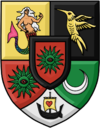Andrew Blackhorse
| Andrew L. Blackhorse | |
|---|---|

| |
10 October 2018 – 3 June 2019 | |
| Deputy | Shounn Virny |
| Predecessor | Noa Dargany |
| Successor | Apollo Cerwyn |
7 October 2018 – 31 May 2019 | |
| Deputy Leader | Shassel Marlaryen |
| Predecessor | Noa Dargany |
| Successor | Shassel Marlaryen (acting) |
26 August 2015 – 5 June 2017 | |
| Deputy Leader | Qian An Noa Dargany |
| Predecessor | Bertrand Rivière |
| Successor | Noa Dargany |
28 May 2018 – 10 October 2018 | |
| Prime Minister | Noa Dargany |
| Predecessor | Emmanuel Starlynn |
| Successor | Shounn Virny |
22 May 2017 – 10 October 2018 | |
| Prime Minister | Noa Dargany |
| Predecessor | Apollo Cerwyn |
| Successor | Shounn Virny |
22 May 2017 – 28 May 2017 | |
| Prime Minister | Noa Dargany |
| Predecessor | Anton Schubert-Moss |
| Successor | Shassel Marlaryen |
3 October 2015 – 22 May 2017 | |
| Prime Minister | Shounn Virny |
| Predecessor | Étienne Boulin |
| Successor | Apollo Cerwyn |
| Birth name | Andrew Lidafegios Blackhorse |
| Citizenship | Sabioveronese |
| Political party | Liberal (since 2014) Communist Party (2013–14) |
| Religion | Pahunist |
| Allegiance | |
| Service/branch | Royal Land Army |
| Rank | |

- In this traditional Sabian name, Abakañvái is the matronymic and Brakħors is the family name.
Andrew Lidafegios Blackhorse (Sabian: andru abakañvái brakħors) is a Sabioveronese politician and former Army Major who served as the 8th Prime Minister of Sabia and Verona from 2018 to 2019, and as leader of the Liberal Party twice, from 2015 to 2017 and then from 2018 to 2019. He has been a Member of Parliament since 2015, first representing the single-member constituency of Sejê-Kepren and later the multi-member list constituency of Alios.
A former member of the Communist Party of Sabia and Verona (KMCW), Blackhorse rose to prominence in 2012 for his participation in the "revolt of the Three Kings" alongside Albert Gold and Leandro Casablanca. Blackhorse became a member of the Unity Party (later renamed as the Liberals under his leadership) shortly after the dissolution of the KMCW in early 2014, and became its leader after Bertrand Rivière's resignation in the Haronos Plan. After serving as Leader of the Opposition from 2015 to 2017, he led the Liberals to their second-ever best result in 2017, but resigned from the leadership to allow his deputy, Noa Dargany, to become Prime Minister in his stead.
In 2018, after serving as Deputy Prime Minister and Secretary of Welfare in her two cabinets, Blackhorse challenged Dargany for the leadership of the Liberal Party. On 7 October 2018, Blackhorse defeated Dargany and became leader of the party once again, going on to become Prime Minister after Parliament confirmed his government proposal on 10 October 2018.
Early life
Blackhorse is of Venezuelan and German origin. His family settled in Caenia a couple of years before the creation of Sabia and Verona, but he claims to be from Verona and lived in Abrelia before partaking in Haronos in 2015. He is a cousin of Leandro Casablanca.
In November 2012, Blackhorse led a small rebellion against the government of Napoléon Bleuberrie with the help of Casablanca and fellow Abrelian Albert Gold, proclaiming himself "King of the East" as he secured the Quar District in Tegula with the help of locals, who were later discovered to be Unity Party members.[1] The insurgency was quashed by government forces and Blackhorse, alongside Gold and Casablanca, was put in the Land Army's penal conscription system, in which he had to collaborate with the Army and participate in its activities in order to clear his name.[2]
Blackhorse stayed in the Land Army for a year, in which he rose to the rank of Major. Due to the specifications of the penal conscription law, he was unable to ascend to the higher ranks, yet he received congratulatory notes by Adm. Noa Dargany and Gen. Boris Tovinski on his co-operative attitude and "notorious service to the nation".
Political career

After being honorably discharged from the army in November 2013, Blackhorse got involved with the Communist Party of Sabia and Verona (KMCW), which had broken away from the Socialist Party earlier that year following the 2013 failed self-coup attemp led by Socialist Napoléon Bleuberrie. During his time in the KMCW, Blackhorse got close to the likes of Léon Galieri, and the Jens brothers Snø and Vinter.
When the KMCW merged with the Socialist Party again to form the Left Alliance in 2014, Blackhorse didn't join the new leftist party but rather became interested in the Unity Party, which at the time was seeing the rise of the charismatic Bertrand Rivière. Rivière became leader shortly after Blackhorse joined the party, in June 2014. After the September 2014 general election, in which Unity emerged as the largest party in government, Blackhorse began to get actively involved in the party's inner workings and became Treasurer of the Party in December 2014.
Party leader
In early 2015, Blackhorse became one of the dissident voices of Unity that rallied against Rivière and what was perceived as his authoritarian style of government. Blackhorse attended the Congress of Salisse but did not participate in the writing of the new constitution. He was one of the few Unity Party members who participated in the Haronos Plan, and on 26 August 2015 he was chosen by the barons of the party to succeed Rivière as party leader.
Though Unity dwindled in numbers in Alios, Blackhorse gained the support of many native Aliosikar, and gained 40% of the popular vote in the 2015 general election, the highest percentage of the popular vote Unity had seen since the 2012 election.[3] Despite gaining 40% of the vote, Unity received only 30% of representation in the new Parliament.
During Blackhorse's leadership of Unity, the party saw a shift from the radical right-wing, social conservative policies of Rivière to a more moderate social liberal approach,[4] as Blackhorse and the party voted in favor of same-sex adoption and the reduction of military spending.[5] In April 2016, Blackhorse met with Prime Minister Shounn Virny in the Kodesari neighborhood of Alios to discuss the upcoming general election and other topics.[6] During the meeting, Blackhorse announced he had intentions to resign as party leader, and hinted at the possibility of vouching for a native Aliosikar as his successor. However, popular support for him as party leader remained high among Unity voters.[2] At the 2016 election, Blackhorse led Unity to its best results since 2012, taking 42% of the popular vote and 9 out of 20 seats in Parliament.[7] Falling short of a majority, Unity lost the chance to govern when the NNS and the Left formed a leftist coalition, leaving the blue party to be the Opposition once again.
In November 2016, for the Unity Conference 2016, Blackhorse presented the New Valtirian Plan, a new platform for the Unity Party that radically changed its core ideology and most notably, its name. Unity, thenceforth known as the Liberals, officially became a social liberal and laissez-faire capitalist party.[8]
At the 2017 general election, Blackhorse led the party to its best result since 2012, getting 52% of the popular vote and falling just a seat short of a complete majority. After the election, Blackhorse announced he intended to resign as party leader, and instead Deputy Leader Noa Dargany led the talks to form a new government.
Dargany governments
Dargany became Prime Minister on 22 May, when Blackhorse assumed two cabinet positions: secretary of diplomacy (foreign affairs) and welfare. On 5 June 2017, Dargany succeeded Blackhorse as party leader following the first leadership election in the party's history.[9][10]
Following the 2018 general election, the Liberals maintained the government and Dargany formed her second government. Blackhorse then assumed the deputy P premiership, succeeding Emmanuel Starlynn.
Personal life
Blackhorse is commonly described as "reclusive and mysterious", refusing to speak about his private life and affairs distinct from his political career. He is a Pahunist, though he was raised in the Lutheran tradition. It is unknown what the origin of the Blackhorse surname is, as the former Major is neither black nor a horse, but a light-brown bear. Blackhorse uses a false matronymic, a common practice among Alios residents: abakañvái can be translated as "child of unity" (from the Sabian abakañ), though it may also be translated as "child of a marriage". His middle name, Lidafegios, means "pride of the clan" or "pride of the family" in Middle Sabian.
References
- ↑ "Land Army and Gendarmería arrest Unity Party members". The SiV Phonograph. 6 December 2012. Retrieved 1 May 2016.
- ↑ 2.0 2.1 "Most Unity voters want Blackhorse to remain leader, poll says". The SiV Phonograph. 1 May 2016.
- ↑ "Virny and the Guild take the lead". The SiV Phonograph. 20 September 2015.
- ↑ "Gentlepeople, start your engines: Goyo and Boulin to run for second terms". The SiV Phonograph. 27 March 2016.
- ↑ "Editorial: the NNS is losing its ground". The SiV Phonograph. 25 April 2016.
- ↑ ""A step in the right direction": Virny and Blackhorse meet in Kodesari". The SiV Phonograph. 4 April 2016.
- ↑ "Decision 2016: Conservatives fall short of majority". The SiV Phonograph. 18 September 2016.
- ↑ "Unity is dead, long live the Liberals". The SiV Phonograph. 14 November 2016.
- ↑ "Liberals to choose new leader on June 5" The SiV Phonograph. 31 May 2017. Retrieved 7 June 2017.
- ↑ "Parliament confirms Dargany's government" The SiV Phonograph. 22 May 2017. Retrieved 7 June 2017.
| Political offices | ||
|---|---|---|
| Preceded by Noa Dargany |
Prime Minister of Sabia and Verona 10 October 2018 – present |
Succeeded by Incumbent |
| Preceded by Emmanuel Starlynn |
Deputy Prime Minister 28 May 2018 – 10 October 2018 |
Succeeded by Shounn Virny |
| Preceded by Apollo Cerwyn |
Secretary of Diplomacy 22 May 2017 – 10 October 2018 |
Succeeded by Shounn Virny |
| Preceded by Anton Schubert-Moss |
Secretary of Welfare 22 May 2017 – 28 May 2018 |
Succeeded by Shassel Marlaryen |
| Parliament of Sabia and Verona | ||
| Preceded by New constituency |
MP for the Alios List 22 May 2017 – present |
Succeeded by Incumbent |
| Preceded by Étienne Boulin |
Leader of the Opposition 1 October 2015 – 22 May 2017 |
Succeeded by Apollo Cerwyn |
| Preceded by New constituency |
MP for Sejê–Kepren 1 October 2015 – 22 May 2017 |
Succeeded by Constituency abolished |
| Party political offices | ||
| Preceded by Noa Dargany |
Leader of the Liberals 7 October 2018 – present |
Succeeded by Incumbent |
| Preceded by Bertrand Rivière |
Leader of the Liberals 26 August 2015 – 5 June 2017 |
Succeeded by Noa Dargany |
| Juclandian rule | Napoléon Bleuberrie (first • third) • Osez Kóvérsz (second) • Ann Stefanović (fourth) • Léon Galieri (fifth) • Bertrand Rivière (sixth) |
|---|---|
| Independence | Shounn Virny (seventh • eighth) • Noa Dargany (ninth • tenth) • Andrew Blackhorse (eleventh) • Apollo Cerwyn (twelfth • thirteenth) |
